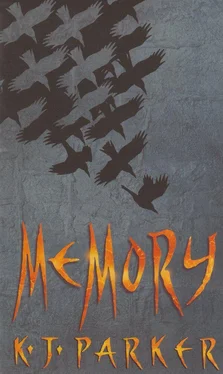K Parker - Memory
Здесь есть возможность читать онлайн «K Parker - Memory» весь текст электронной книги совершенно бесплатно (целиком полную версию без сокращений). В некоторых случаях можно слушать аудио, скачать через торрент в формате fb2 и присутствует краткое содержание. Жанр: Фэнтези, на английском языке. Описание произведения, (предисловие) а так же отзывы посетителей доступны на портале библиотеки ЛибКат.
- Название:Memory
- Автор:
- Жанр:
- Год:неизвестен
- ISBN:нет данных
- Рейтинг книги:5 / 5. Голосов: 1
-
Избранное:Добавить в избранное
- Отзывы:
-
Ваша оценка:
- 100
- 1
- 2
- 3
- 4
- 5
Memory: краткое содержание, описание и аннотация
Предлагаем к чтению аннотацию, описание, краткое содержание или предисловие (зависит от того, что написал сам автор книги «Memory»). Если вы не нашли необходимую информацию о книге — напишите в комментариях, мы постараемся отыскать её.
Memory — читать онлайн бесплатно полную книгу (весь текст) целиком
Ниже представлен текст книги, разбитый по страницам. Система сохранения места последней прочитанной страницы, позволяет с удобством читать онлайн бесплатно книгу «Memory», без необходимости каждый раз заново искать на чём Вы остановились. Поставьте закладку, и сможете в любой момент перейти на страницу, на которой закончили чтение.
Интервал:
Закладка:
Recurrence, eternal, he read. It is a precept of religion that nothing happens for the first time; that all learning is recollection; that the perfect draw is perfect because it has already taken place. Oh for pity's sake, Poldarn thought, but he carried on reading anyway. The argument runs that in religion everything progresses to a state of perfection (q.v.) in which further improvement is impossible, whereas outside of religion everything tends to a state of dissolution, in which no further deterioration or decay is possible, e.g. decomposition of organic material, erosion of rock into dust, reduction by fire of solid material to smoke and ash; the two final states, perfection and dissolution, being parallel and essentially the same in nature, though not inform or quality. Religion predicates that, since the world is over five thousand years old (see gods, origin of; world, age of; creation, history of), inevitably both processes-progress and decline-must by now have run their full course and be complete, in which case it necessarily follows that the material world as we encounter it is made up of the end products of said processes, namely religion (the perfected state) and that which is outside religion (the declined state, chaos) and that all human experience is therefore merely recollection of incidents that have occurred during the course of one of the two said processes, remembered out of context, as if in a vision, hallucination, prophesy, nightmare or dream. This conclusion is expressed in religion in the form of the divine Poldarn, who will return at the end of all things-which has, of course, already taken place at some unspecified point in the past-to destroy the world and replace it with perfection (namely the state of affairs currently pertaining, i.e. in religion). In applied religion, perfection is expressed in the draw, where constant repetition during training and practice eliminates the act of drawing in the moment at which the intention is formed, so that the sword has already left the scabbard as soon as the hand moves towards it. In observed religion (see ethics, applied) the process of dissolution is expressed in the reduction of materials, e.g. by rotting, weathering, burning, and the process of perfection is expressed as surviving that of dissolution in the perfection of reduced materials, e.g. by fire, e.g. sand to glass, wood to charcoal, ore to metal; essential religion is expressed in the salvation of reduced materials, e.g. scrap reshaped into new objects; the latter giving rise to the so-called essential paradox, whereby salvation can only occur where memory is destroyed in salvaged materials (i.e. when they lose their old shape and are given a new one), the paradox being that the superior or religious process of perfection is thus observed to follow and be dependent upon the inferior or secular process of destruction. This paradox is most usually expressed in the image of the burned scavenger.
Poldarn wasn't quite sure he followed that, but he couldn't be bothered to go back and read it again; if Spenno spent all his time reading this idiotic book, he thought, no wonder he's barking mad. He turned down the corner of the page and put the book where he could reach it again once his head had stopped hurting.
It hadn't done its job, in any case; he'd only bothered with it in the hope that it'd distract his mind from going over once again what Gain Aciava had told him, and the snatches of what he assumed were memories that stayed with him when he woke up from dreams. As for Gain Aciava himself, whisked away in a cart by soldiers-arrested? Recalled? Rescued?
I'd run away, Poldarn thought, if only they'd let me up out of this bed.
The very least of his concerns was missing the inaugural melt and pour of Galand Dev's utterly foolproof new furnace; but Chiruwa came by a certain time later (how long, Poldarn had no idea; days passed, and he'd long since lost track of them) with the latest news. A fifteen-inch crack had appeared in the firebox wall; the prime suspect was non-homogeneous clay, but birchwood charcoal was also under suspicion. Galand Dev and Spenno had almost but not quite come to blows over the question of whether it could be salvaged or whether they'd have to tear the whole thing down and start again.
A certain time after that, Banspati the foreman came to see him.
'What're you doing still in bed?' he demanded. 'You look just fine to me.'
'Oh,' Poldarn replied. 'That's good. Does that mean I can get up?'
Banspati thought for a moment. 'They were supposed to be getting a doctor in from Falcata,' he said, 'but I don't know what became of that idea. Do you feel all right?'
'More or less,' Poldarn replied. 'But I don't really know what's going on under all these bandages. Do you think I could take them off and have a look?'
Banspati seemed unwilling to commit himself. He wasn't a doctor, he pointed out.
'Well,' Poldarn suggested, 'how'd it be if I said it was all right?'
'You aren't a doctor either.'
'I could be,' Poldarn said, 'for all either of us know.'
Banspati didn't seem very impressed with that line of reasoning. 'Maybe you should just stay put till the doctor gets here,' he said. 'I mean, it's been weeks since they were going to send for him, so he could arrive any day now.'
'So he was sent for, then.'
'They were going to send for one,' Banspati replied.
'But you don't actually know whether they ever got round to it?'
Banspati scowled. 'I'm only the bloody foreman,' he protested. 'I can't do every single fucking thing myself, can I? Besides, you're still alive, so what're you cribbing about? If what they say about the doctors up Falcata's right, he'd have killed you for sure.'
In the end they compromised, as men of goodwill always do when their interests coincide; Poldarn was to stay in bed until the next morning, after which he was at liberty to get up, take off his bandages (entirely at his own risk, needless to say) and report for work. If he was still alive at the end of his shift, he could consider himself officially better.
Perhaps it was the effort of arguing the toss with the foreman; Poldarn slept well, without dreaming, and woke up feeling strong and cheerful. His legs felt unsteady, calflike, after so many weeks of disuse, but he refused to indulge them, and walked awkwardly up and down the shed until they began to regain their memory. Once he was fairly confident that he could make it across the yard without falling over, he sat down on an empty barrel and unwrapped the bandages on his hands.
His skin felt cold without them, but it was still there; white and unnaturally smooth in places, extremely sensitive. He flexed his fingers until he could extend them without discomfort. Everything seemed to be in order; business as usual.
It took him a while to find the knot that secured the bandage wrapped round his face; it was at the back of his head, cunningly placed so as to be almost inaccessible (and he was clumsy with knots, he discovered). He picked at it for a while until he noticed a small knife, rusty and neglected, lying on the floor a few yards away. It was blunt too, but sharp enough to saw through the knot, eventually. The bandage was stiff, as though it had been starched. Once again, these was a distinct chill on his skin once it had gone. No matter.
The daylight hurt his eyes, even though the sky was black and grey-still the rainy season, then, and no comfort for Galand Dev, with his potentially self-destructive furnace. But the air smelled wonderfully fresh, and most of all, different. Poldarn grinned as he walked slowly across the yard, heading for the small stream that fed off the river, just below the mud-diggings.
He found a place where the stream ran between broad, flat rocks. Ferns had somehow found a footing there, and their shade had attracted moss, deep and soft. Where the stream fell from one rock to another there was a shallow pool about a handspan deep. He knelt down-knees grudging and rusty-and looked at his reflection.
Читать дальшеИнтервал:
Закладка:
Похожие книги на «Memory»
Представляем Вашему вниманию похожие книги на «Memory» списком для выбора. Мы отобрали схожую по названию и смыслу литературу в надежде предоставить читателям больше вариантов отыскать новые, интересные, ещё непрочитанные произведения.
Обсуждение, отзывы о книге «Memory» и просто собственные мнения читателей. Оставьте ваши комментарии, напишите, что Вы думаете о произведении, его смысле или главных героях. Укажите что конкретно понравилось, а что нет, и почему Вы так считаете.












